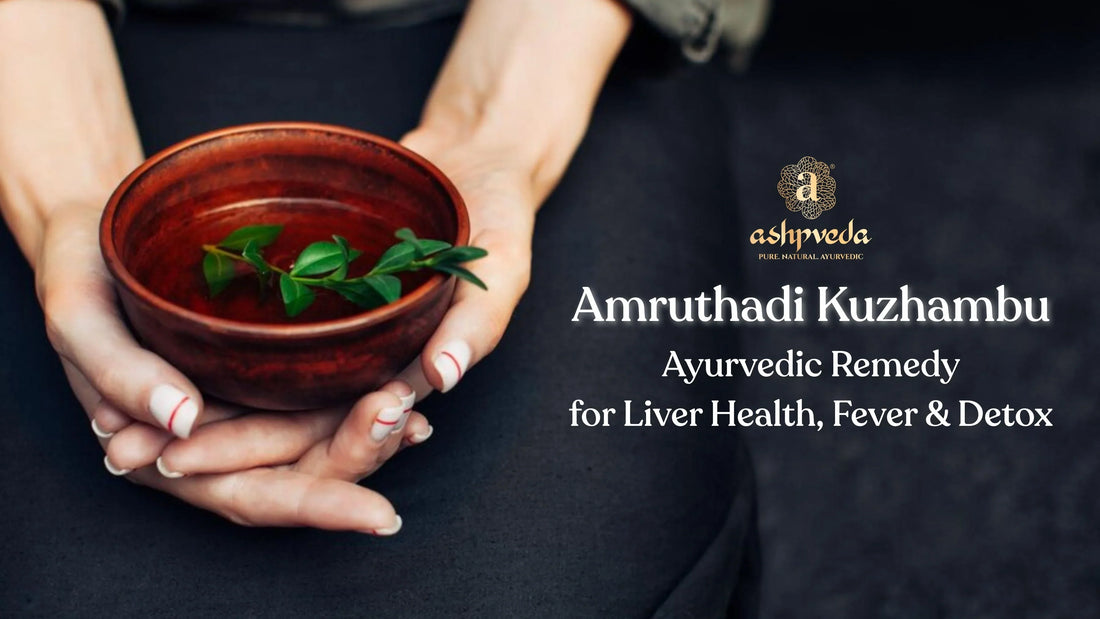
Amruthadi Kuzhambu (also spelled Amritadi Kuzhambu) is a classical Ayurvedic formulation primarily used for fever, liver disorders, digestive issues, and systemic detoxification. Rooted in ancient medicinal wisdom, it is particularly effective in conditions caused by the aggravation of Pitta and Kapha doshas.
The term “Amruthadi” refers to the presence of Amrutha (another name for Guduchi/Tinospora cordifolia)—a powerful herb known for its immunomodulatory, antipyretic, and detoxifying actions.
What is Amruthadi Kuzhambu?
Amruthadi Kuzhambu is a medicated decoction concentrate (kuzhambu) used in Ayurvedic practice to treat:
- Fevers (Jwara)
- Liver and spleen disorders
- Indigestion and sluggish metabolism
- Toxic buildup in the body
It is a potent detoxifier, often prescribed to clear Ama (toxins), especially when associated with chronic or recurring fever, skin issues, or poor digestion.
Key Ingredients of Amruthadi Kuzhambu
-
Amrutha (Guduchi / Tinospora cordifolia) – A powerful anti-inflammatory and fever-reducing herb that strengthens immunity and supports liver function.
-
Patola (Trichosanthes dioica) – Supports liver detox and helps in reducing inflammation.
-
Nimba (Neem) – A blood purifier and antimicrobial herb that helps clear toxins.
-
Vasa (Adhatoda vasica) – Useful in managing respiratory congestion and inflammation.
- Haritaki, Bibhitaki, Amalaki (Triphala) – Gentle detoxifiers that regulate digestion and metabolism.
These ingredients work together to reduce heat and inflammation, strengthen the liver, and balance Pitta and Kapha.
Benefits of Amruthadi Kuzhambu
🔸 1. Reduces Fever Naturally
Its antipyretic herbs help bring down both acute and chronic fevers—especially those caused by infection, inflammation, or toxin accumulation.
🔸 2. Supports Liver and Spleen Health
Improves bile flow, supports liver detoxification, and helps with conditions like hepatitis, enlarged liver/spleen, or jaundice.
🔸 3. Clears Ama (Toxins)
Helps eliminate undigested metabolic waste (Ama) from the system, improving energy, digestion, and immunity.
🔸 4. Balances Pitta and Kapha
Useful in treating skin rashes, heat-related issues, and mucus-related respiratory conditions often caused by imbalanced Pitta and Kapha.
🔸 5. Strengthens Immunity
Guduchi and Triphala in the formula are known to rejuvenate the immune system and protect against recurring infections.
How to Use Amruthadi Kuzhambu
-
Dosage: Usually 5–15 ml once or twice daily, with warm water, before meals.
-
Duration: As directed by your Ayurvedic practitioner.
-
Form: Can be taken alone or along with other formulations depending on your condition.
⚠️NOTE: Always use under the guidance of an Ayurvedic doctor, especially in chronic or systemic health issues.
Who Can Benefit from Amruthadi Kuzhambu?
This formulation is ideal for:
- Individuals with recurring fevers or post-viral fatigue
- People suffering from liver or spleen issues
- Those with digestive sluggishness, skin eruptions, or Pitta-Kapha disorders
- Anyone looking to detoxify and strengthen immunity
Final Thoughts
Amruthadi Kuzhambu is an age-old Ayurvedic formula designed to detoxify the body, combat fever, and support healthy liver function. If you’re dealing with recurrent infections, digestive toxicity, or inflammatory conditions, this herbal powerhouse can help restore balance and vitality—naturally.
As with all potent Ayurvedic medicines, the best results come with proper diagnosis, dosage, and holistic lifestyle support.
FAQs About Amruthadi Kuzhambu
Q1: Can I take Amruthadi Kuzhambu for dengue or viral fever?
It is sometimes used as a supportive Ayurvedic remedy in viral fevers due to its immune-boosting and detox effects—but always under a doctor's supervision.
Q2: Is it safe for children?
Yes, but dosage must be adjusted based on age and body weight. Pediatric use should be strictly guided by an Ayurvedic doctor.
Q3: Does it have side effects?
It is generally safe when taken correctly. Overuse may cause dryness or slight digestive upset in people with high Vata. Always follow prescribed dosage.
Q4: Can it be taken alongside allopathic medicines?
In many cases, yes. However, consult both your doctors to avoid interactions and overlap.
Q5: Is it available in tablet or capsule form?
Traditionally, it’s available as a kuzhambu (liquid decoction), but some manufacturers may offer it in modern formats.
- Choosing a selection results in a full page refresh.

